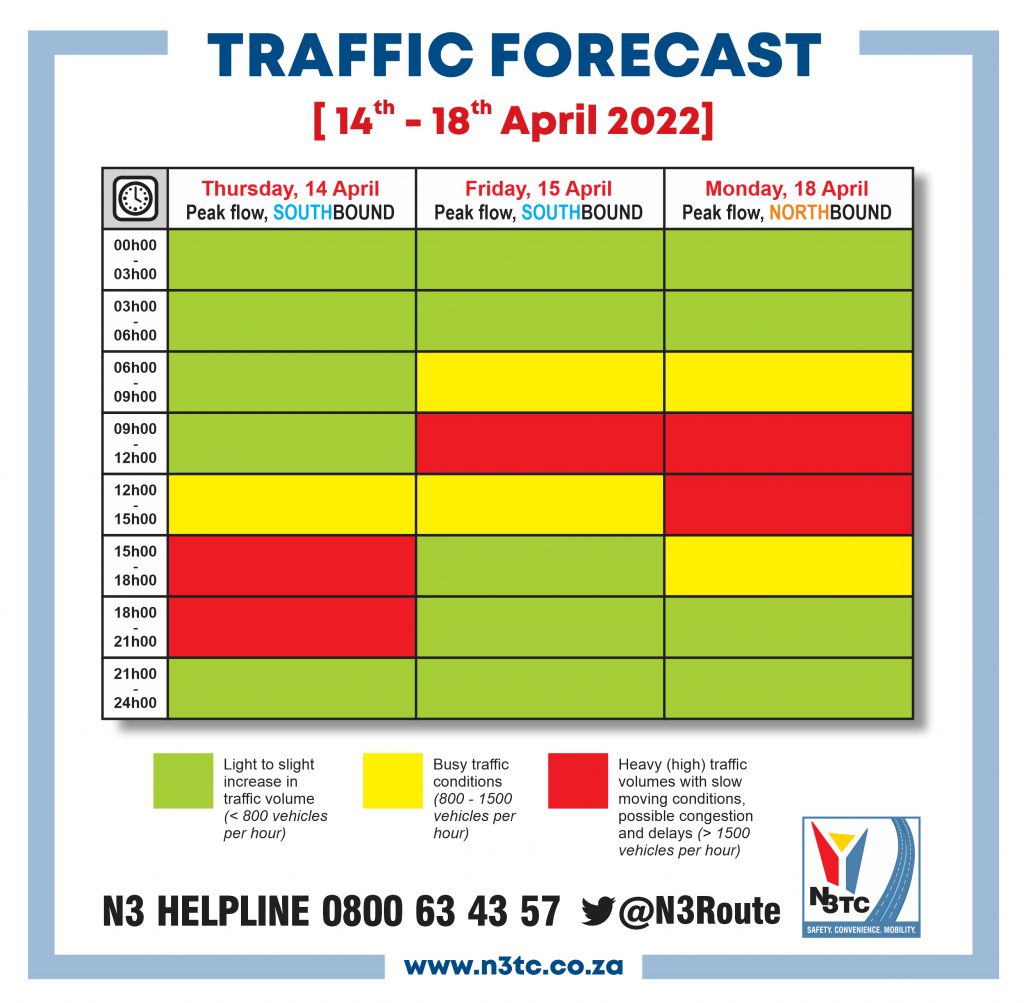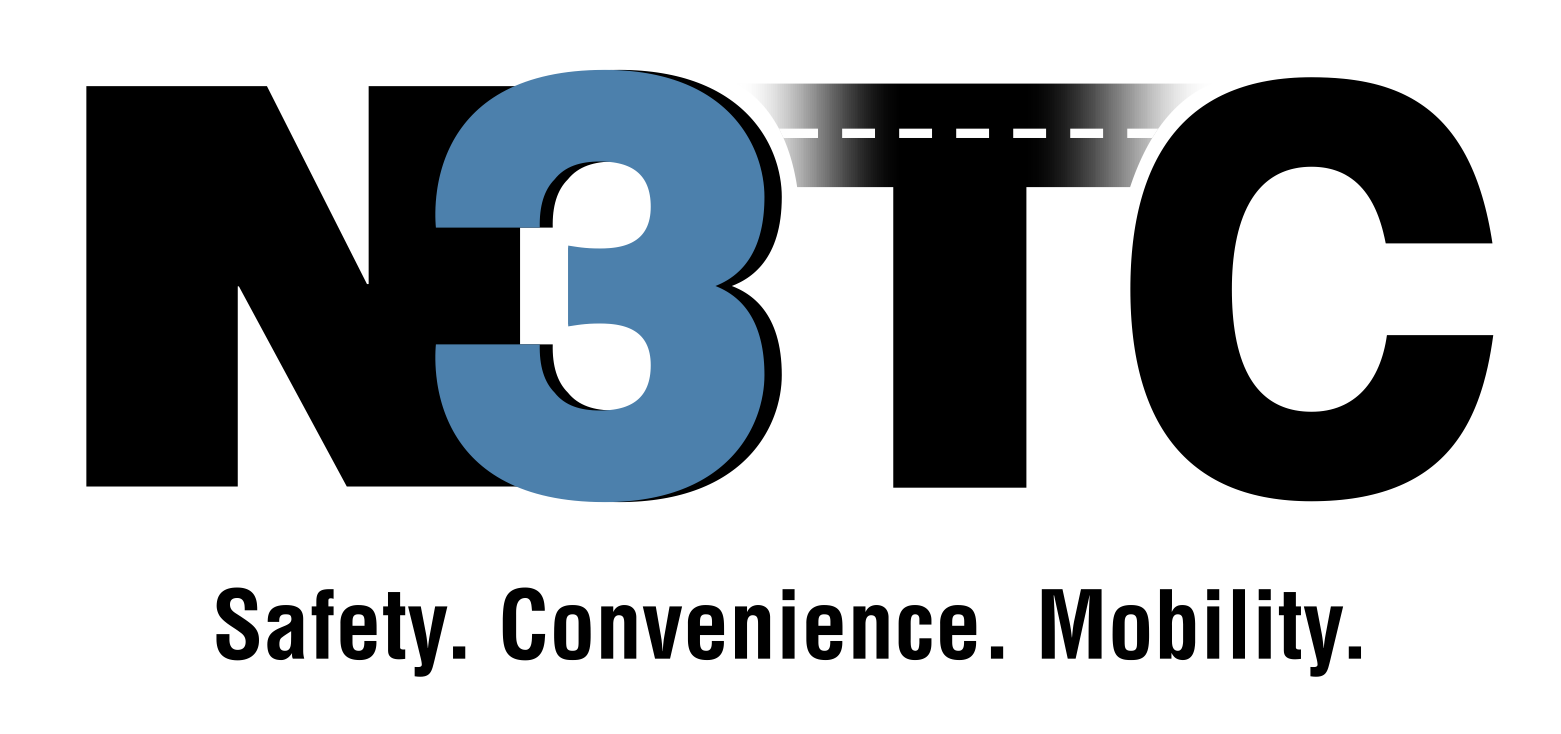Careful planning and defensive driving are critical to ensuring safer roads this Easter
High traffic volumes and wet weather conditions are expected on the N3 Toll Route this Easter weekend. Heavy rain, thunderstorms, fog and poor visibility may disrupt the flow of traffic along various parts of the N3 Toll Route during peak hours on Thursday and Friday.
Poor weather, high traffic volumes, emergency situations and prevailing road conditions may adversely impact road safety and travel experiences. Therefore, it is incumbent on all road users to be prepared for any travel conditions, and to allow sufficient travel time to make provision for possible emergencies or delays.
“Demands on drivers escalate during peak traffic periods. Plan ahead to avoid additional risks such as late-night driving, tiredness and a lack of concentration,” explains Thania Dhoogra, operations manager of N3 Toll Concession (N3TC).
Crash data sounds important warnings to drivers
Driver skill and attitude play an important part in the reduction of road crashes.
Crash data from 2021 and the first quarter of 2022 indicates that 73% of all light motor vehicle crashes, and 80% of all heavy motor vehicle crashes on the N3 Toll Route can be attributed to driver error and/or negligence. The majority of these crashes are single vehicle crashes, where drivers lost control of their vehicles, and their vehicles either left the road or rolled. From 2019 to 2021, the number of vehicles that rolled on the N3 Toll Route increased by 39.2%.
Number of head-on collisions cause for concern
“Even more concerning, is the steady rise in the number of head-on collisions from 2019 to 2021,” says Ms Dhoogra. “During 2019, 14 head-on collisions were reported. In 2020, when Covid-19 travel restrictions applied, the number of head-on collisions decreased slightly to 12; but by 2021, when traffic volumes started to recover, the number of head-on collisions doubled again to 24.
Often, head-on collisions are the result of multiple vehicle crashes which is another reason why the rise in these collisions is considered to be significant and deeply worrying,” stresses Ms Dhoogra.
Head-on collisions are one of the most dangerous types of crashes because of the force of impact, and the seriousness of the injuries sustained by drivers and their passengers (which are often fatal or life-altering).
Sharing the road responsibly
This Easter weekend, N3TC is also expecting a marked increase in the number of public transport vehicles, including buses and minibus taxis; notwithstanding, that the N3 Toll Route is an equally important freight route, with large numbers of heavy vehicles traversing the route transporting goods between Gauteng and KwaZulu-Natal on a daily basis. Road users should not expect a significant drop in truck traffic over weekends and public holidays.
Motorists are warned to allow for slower-moving heavy motor vehicles along the route. Remember, there is a significant speed differential between heavy vehicles and faster-moving light vehicles. The maximum speed limit for public transport vehicles is 100km/h, and for heavy motor vehicles the limit is reduced even further to 80km/h.
As a result of their mass, trucks and buses require longer stopping distances. It is unwise to ever just cut in front of a heavy vehicle as drivers may be forced to brake suddenly, which can easily cause the vehicle to jack-knife. Heavy vehicle drivers also need to slow down on their approach to bends and curves in the road to avoid the risk of losing control and or over-turning their vehicles.
Never tailgate trucks and buses. Drivers cannot see vehicles travelling too closely behind them, in their blind spots. Stay well behind trucks and buses to avoid rear-end collision, and only pass large vehicles if you are certain that the driver can see you – never from directly behind.
Extra caution is required around heavy motor vehicles when it rains and at night, or when visibility is poor. In wet weather, the splash and spray from trucks and buses, make overtaking of heavy vehicles even more dangerous.
Drivers can assist to reduce crash trauma by adopting defensive driving habits
On the road, the price of high-risk behaviour and judgment errors is steep. People suffer tremendous physical, emotional and financial trauma as a result of road crashes. A crash is a fiercely violent action subjecting the body to huge forces which it cannot absorb. This Easter weekend, N3TC appeals to all drivers to make defensive driving their top priority.
“A few simple safety measures – such as keeping a safe following distance; adhering to the speed limit or reducing speed when travel conditions are poor; NEVER making U-turns or overtaking on blind rises and solid lines; avoiding distractions; not using mobile devices while driving; only driving sober; and staying focussed, alert, patient and courteous – can make all the difference and help to save lives,” explains Ms Dhoogra.
Additional road safety and emergency resources will be deployed on the N3 Toll Route
N3 Toll Concession, and its partners in law enforcement and emergency services, will deploy additional resources to support road users, and to encourage safety along the route. The following initiatives can be expected this Easter weekend:
- Multi-disciplinary satellite stations from where provincial-, private- and volunteer groups will offer various emergency services, including air ambulances and advanced life support
- Vehicle roadworthiness checks, drug and alcohol screening and public transport safety tests at a number of traffic checkpoints
- Visible policing and strict enforcement, including additional highway patrols, crime prevention initiatives, pedestrian and hawker control, and zero tolerance of traffic offenders
- Dedicated towing and recovery teams stationed along the route
- Emergency support services offered by BMW SA, the Road Safety Foundation and Rescue Tech patrols
- Additional patrols by N3TC’s Route Services, who will focus their attention on providing roadside assistance and traffic support, especially during peak times, and along Van Reenen’s Pass
Expected peak traffic forecast
High traffic volumes of 2500 vehicles per hour are expected on the N3 Toll Route in a southbound direction (towards KwaZulu-Natal) on Thursday, 14 April (between 15H00 and 21H00) and on Friday, 15 April (from 09H00 to 12H00).
On Monday, 18 April 2022 return traffic is expected to peak at approximately 3500 vehicles per hour northbound (towards Gauteng) between 09H00 and 15H00.

Emergency and law enforcement services will be on high alert throughout the weekend, and should it be deemed necessary, the Roads Traffic Inspectorate may implement special traffic control measures to manage the flow of traffic and to improve general safety along the route.
Road construction and maintenance
The N3 Toll Route is currently being rehabilitated and upgraded between Frankfort/Vrede and Warden in the Free State. Special maintenance work is underway between Lions River and Tweedie.
However, no scheduled construction work will be performed from 14 – 18 April 2022 to accommodate the expected increase in traffic volumes. Only emergency maintenance work will be undertaken, if required.
Although at least two traffic lanes will be available to accommodate traffic in each direction, road users are warned that short shoulder lane closures may occur along some construction areas.
As a safety measure, reduced speed limits will apply in all construction areas. Road users are reminded to pay careful attention to the various traffic signs along the way.
Toll plazas to operate at maximum capacity
All toll plazas will operate at maximum capacity, but congestion may be experienced during peak periods, especially in a northbound direction (towards Gauteng) on Monday, 18 April.
Payment methods accepted
For increased mobility and safety, tag payment is accepted in all lanes at De Hoek, Wilge, Tugela and Mooi mainline and ramp toll plazas. Other accepted payment methods include credit cards, fleet cards, cash or petrol/garage cards. PLEASE NOTE: No payments with debit cards can be processed at any toll plazas in South Africa.
Dedication to manage emergency incidents
On a busy national route such as the N3 Toll Route, a dedicated and comprehensive route incident management system (RIMS) ensures swift action to limit traffic disruptions during emergencies, and to help prevent secondary incidents.
Incident management starts with the notification of any emergency and only ends once the scene has been cleared and traffic flow restored. Emergencies may include crashes, breakdowns, fires, oil or chemical spills, protest action or any other obstructions that could disrupt the flow of traffic.
Help is just a phone call away
N3TC’s Route Control Centre (RCC) initiates all emergency responses on the N3 Toll Route. Road users can stay in touch with the RCC by following @N3Route on Twitter, or by contacting the 24-hour N3 Helpline on 0800 63 43 57 for a rapid response to emergencies, to report problems, or to obtain verified, up-to-date traffic information on the N3 Toll Route.
“N3TC wishes all our road users a safe and pleasant journey. Please take special care. Great holidays only end when you have arrived safely back home,” ends Ms Dhoogra.
ENDS.

